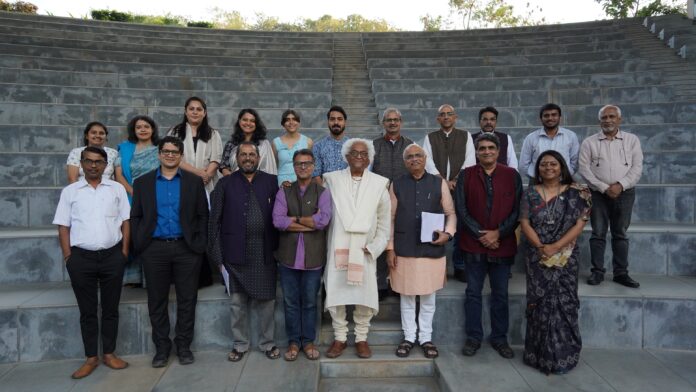- The university hosted a day-long roundtable discussion on its campus about promoting (going beyond preserving and protecting) India’s cultural assets.
- The event saw notable personalities from academia, industry, and government like Rajeev Sethi, Vinay Sahasrabuddhe, Mini Menon, Kshipa Shukla, Ganesh Hingmire, amongst others, in attendance.
Pune, India – December 22nd, 2022: FLAME University, the pioneer of liberal education in India, recently organized a day-long roundtable on the topic “India’s Cultural Enterprise: From Protection & Preservation to Promotion”. Hosted by FLAME University on its campus on Tuesday, December 20, 2022, the Roundtable was jointly organized by the Center for Knowledge Alternatives at FLAME University with the Network of Indian Cultural Enterprises (NICEorg). It aimed to foster a dialogue about cultural entrepreneurship, brainstorming on the necessary policy changes required to realize its full potential.
India’s vibrant and diverse cultural assets—both tangible and intangible—span music, dance, art, craft, fashion and accessories, home decor and furnishing, food and beverage, health and wellness, experiential tourism, and much more. However, these cultural assets or any aspect related to them lack any meaningful representation on the global stage and are unable to generate economic value in terms of livelihood, wealth, or the soft power of ‘Brand India’. Consequently, the cultivation and facilitation of cultural entrepreneurship is recognized as a crucial need for this sector to flourish.
The initiative, led by Prof. Yugank Goyal, Faculty of Public Policy and Founding Director of the Center for Knowledge Alternatives at FLAME University, and Mr. Sanjay Anandaram, Cofounder, NICEorg, sought to shift the focus of the discourse from the preservation of cultural assets to their promotion. The discussion aimed to identify the potential constraints faced by cultural entrepreneurs in the country and how an enabling policy ecosystem can evolve for this sector.
To that end, the roundtable was a holistic attempt—a first in India—to bring together policymakers and cultural entrepreneurs on the same platform. Its participants included representatives from notable government organizations, academic institutions, ecosystem catalysts, think tanks, and cultural entrepreneurs. The panelists of the roundtable were Bharat Damani, Faculty of Entrepreneurship, FLAME University; Chintan Bakshi, CEO, Startup Oasis; Dileep Kore, Founder, Korakari; Ganesh Hingmire, Founder, GMGC (IPR/GI Expert); Kshipra Shukla, Chairperson, UP Institute of Design and Research; Omkar Sathe, Assistant Director, CEED, Gokhale Institute; Mini Menon, Co-founder, and Editor, Live History India; Rajeev Sethi, Chairman-Founder, Asian Heritage Foundation; Sanjay Anandaram, Co-founder, NICEorg; Sunil Jalihal, Founder, Indic Inspirations; Vinay Sahasrabuddhe, President, Indian Council for Cultural Relations (ICCR); Vishpala Hundekari, Founder, Ekibeki; and Yugank Goyal, Faculty of Public Policy and Founding Director of the Center for Knowledge Alternatives at FLAME University.
Speaking about the roundtable, Sanjay Anandaram, Co-founder, NICEorg, said, “I believe that our joint efforts with FLAME University are the important collaborative steps towards bringing culture and entrepreneurship together in the minds of people.”
Rajeev Sethi, Founder, Asian Heritage Foundation, shared, “I am impressed with the University’s vast intellectual resource and the commitment towards building a knowledge society for culture and creative enterprises, not just for India but South Asia as a whole. The roundtable surfaced such invaluable ideas, which can greatly uplift the lives and livelihoods of our artisans.”
Kshipra Shukla, Chairperson, UP Institute of Design and Research, said, “The roundtable was the perfect opportunity to set the context for the need for cultural entrepreneurship, provide instances of other countries, as well as learn from other industries like IT that transformed India’s growth story. Besides that, it also enabled awareness of many policies that have encouraged the rise of cultural entrepreneurship in states like UP in particular.”
Vinay Sahasrabuddhe, President, ICCR, mentioned, “A systematic discourse on this issue is of utmost importance. The prevailing policy framework sees cultural inventory as something that needs protection and preservation, but a lot needs to be done for its promotion. The roundtable brought to the fore how cultural enterprise can become a tool—from livelihood generation, value creation, and wealth creation to the rising soft power of India.”
Prof. Yugank Goyal, Faculty of Public Policy and Founding Director of the Center for Knowledge Alternatives, said, “The roundtable served as the launch of a larger policy research project at the Centre for Knowledge Alternatives at FLAME University and NICEorg. It is important that we begin evolving new frameworks of understanding cultural entrepreneurs because the narratives are lopsided. Culture is becoming an important reputational currency. It is important therefore, for India to carve out sound public policy on cultural entrepreneurship to unlock the potential this sector has for the future.”
The roundtable acted as a platform that aggregated insights from the field, resulting in a series of policy recommendations. The resulting ideas, crisp and specific, will be submitted to the relevant stakeholders, both within and outside the government. The roundtable is likely to be an annual affair so as to continue building on this discourse over time.
Also Read: Orchids The International School bagged 2 awards at the Hyderabad Eldrok India K-12 Summit
About FLAME University
FLAME University is the pioneer of liberal education in India, delivering the country’s premier interdisciplinary education experience. It is driven to being one of India’s most respected and reputed centers of learning – the premier destination of choice for higher education in the nation for learners and teachers, to push the design and nature of studies and to create a societal up-gradation phenomenon, particularly in the fields of liberal education and leadership. FLAME has been set up with an idealistic vision and a social commitment to contribute to society nobly. With 140+ esteemed faculty members, the university offers an unparalleled educational experience. The student-to-faculty ratio is 11:1, unmatched at the higher education level in India. Spread on 60 acres of green expanse with aesthetically designed infrastructure, the campus currently consists of five schools: FLAME School of Liberal Education, FLAME School of Business, FLAME School of Communication, FLAME School of Computing and Data Sciences and FLAME School of Design, Art & Performance. FLAME University has been established as a state-private university vide the FLAME University Act 2014 (Maharashtra Act No. II of 2015) of the Government of Maharashtra. It is recognized by the University Grants Commission (UGC) under Section 2(f), and degrees awarded by the University are recognized under Section 22 of the UGC Act, 1956.
Visit EasyShiksha for skill development courses


































































